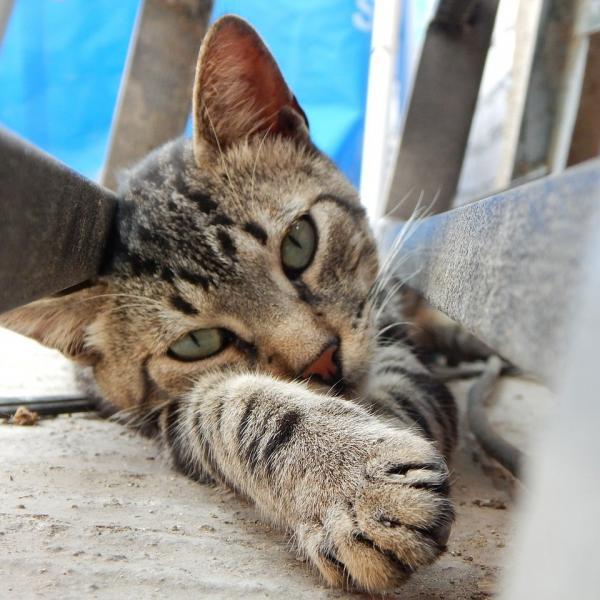If you have a cat, you know that these animals are very special, as pets felines are faithful companions and it is necessary to know the diseases that can suffer to prevent and treat them, protecting your cat and yourself.
Feline AIDS, also known as feline immunodeficiency, is the most affected by the feline population, as well as feline leukemia; however, although there is no vaccine, the disease can be treated effectively.Take care of your pet and take care of it., do not worry and know the details of this disease, the forms of contagion, symptoms and treatment of feline AIDS in this article of Animal Expert.
- Known by the acronym IVF.
- The feline immunodeficiency virus is a lentivirus that only attacks cats.
- Although it is the same disease that affects humans.
- Is caused by a different virus and feline AIDS cannot be transmitted to humans.
IVF directly attacks the immune system, destroying T cells, making the animal vulnerable to other diseases or infections less important, which can be fatal with this disease.
Detected early, feline AIDS is a disease that can be controlled.An infected cat that says proper treatment can have a long and dignified life.
For your pet to become infected, it needs to come into contact with the saliva or blood of another infected cat.Feline AIDS is mainly transmitted through the bites of an infected cat to a healthy cat, so stray cats are more likely to carry the virus.
Unlike the disease in humans, there is no evidence that the feline is transmitted sexually, during the pregnancy of an infected mother or even by sharing sources and feeders between pets.
If your cat is still at home there is no need to worry, however, if you are not neutered and go out at night it is best to have a blood test to check that everything is ok, remember that cats are territorial animals, which can cause stings.
As in humans, a cat infected with the AIDS virus can live for years without characteristic symptoms or until the disease is detected,
However, when the destruction of T cells begins to impair the capacity of the feline immune system, the small bacteria and viruses that our animals face daily without problems can begin to damage the health of the animal, that is when the first symptoms appear.
The most common symptoms of AIDS in cats that may appear months after infection include:
In general, the main symptom of a cat with AIDS is the onset of recurrent diseases; for example, it is important to monitor the sudden onset of common diseases that are slow to go away or if the cat has constant relapses of seemingly minor health problems.
The best medicine is prevention. However, although there is no vaccine for immunodeficiency disease in cats, an infected animal can live a happy life with proper care.
To prevent your cat from getting infected with the AIDS virus, try to control your outings and fights with stray cats, as well as have a monthly check-up once a year (or more, if you go home with some kind of bite) or If this isn’t enough and your cat is infected, it should work to strengthen its defenses and immune system.
There are antimicrobial medications that can help control infections or bacteria that attack the animal, it is important to note that these treatments must be performed continuously, otherwise your feline friend could get new infections, there are also anti-inflammatory medications that help control infections such as gingivitis and stomatitis.
In addition to medications, the diet of cats with AIDS should be special, it is recommended that the diet be high in calories, since canned and moist foods are the ideal ally to combat the weakening of the infected animal.
No treatment directly affects IVF itself.What you can do to help your pet and give it a dignified life is to prevent any opportunistic disease that can attack you while your immune system is weakened.
Life expectancy: It is important to note that the average life expectancy of a cat with feline AIDS is not easy to predict, it all depends on how your immune system responds to the avalanche of opportunistic diseases.When we talk about a dignified life, we are talking about a feline pet with AIDS that can live worthily with a series of minimal care.Although your health may seem to be good, the guardian should be very attentive to things like weight and feline fever.
One of my cats has AIDS but others don’t: if cats don’t fight there’s no chance of contagion, Flaine’s AIDS is transmitted only by bite, however, as it’s a difficult aspect to control, we recommend isolating the infected cat as if it were an infectious disease.
My cat died of AIDS.Is it prudent to adopt another ?: Without the carrier, IVF (feline immunodeficiency virus) is very unstable and does not survive more than a few hours, in addition, feline AIDS is transmitted only through saliva and blood, therefore, without infected cat biting, the contagion of a new pet is very unlikely.
However, like any other infectious disease, we recommend some preventive measures:
Can I get infected by a cat with AIDS?: No, the feline is not transmissible to humans, an AIDS-infected cat can never infect a person, even though it bites it, although it is the same disease, IVF is not the same virus that infects humans In this case, we are talking about HIV, the human immunodeficiency virus.
This article is for informational purposes only, in Animal Expert.com.br we cannot prescribe veterinary treatments or make any type of diagnosis, we suggest that you take your pet to the veterinarian in case of any condition or discomfort.
If you would like to read articles similar to, we recommend that you visit our Infectious Diseases section.

